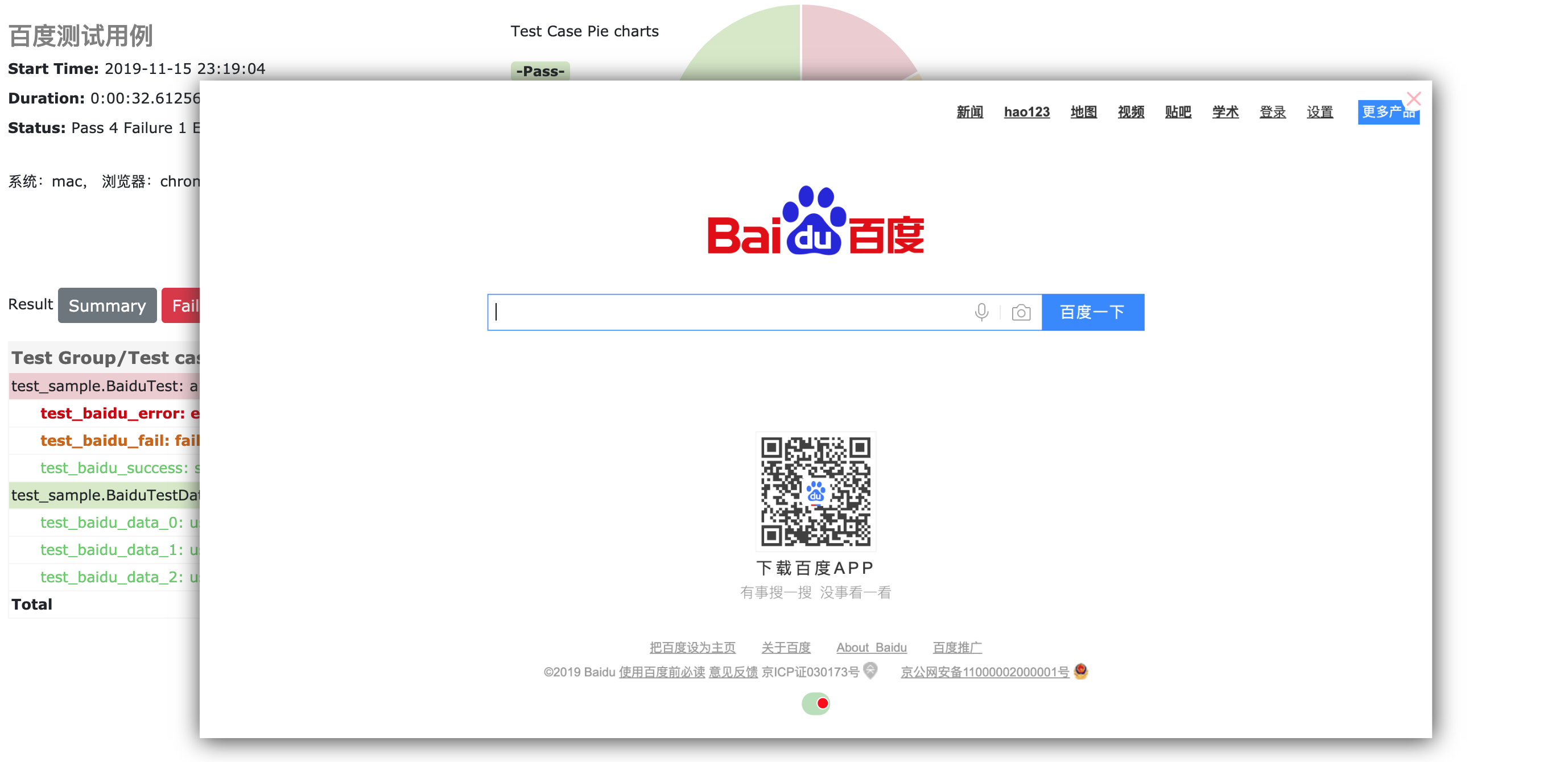pyse renamed to seldom

WebUI automation testing framework based on Selenium and unittest.
Web UI automation testing framework based on selenium and unittest.
features
- Provide a simpler API to write automated tests.
- Provide scaffolding to quickly generate automated test projects.
- Automatically generate HTML test report generation.
- Self-contained assertion method, assert title, URL and text.
- Support for use case parameterization.
- Support re-run of use case failure.
- Use case failure/error screenshot.
Install
> pip install seldom
If you want to keep up with the latest version, you can install with github repository url:
> pip install -U git+https://github.com/defnngj/seldom.git@master
Quick Start
1. View help:
> seldom -h
usage: seldom [-h] [-V] [--startproject STARTPROJECT] [-r R]
WebUI automation testing framework based on Selenium.
optional arguments:
-h, --help show this help message and exit
-V, --version show version
--startproject STARTPROJECT
Specify new project name.
-r R run test case
2. Create a project:
>seldom --startproject mypro
3. Directory structure:
mypro/
├── test_dir/
│ ├── test_sample.py
├── report/
└── run.py
test_dir/The catalog implements use case writing.report/The directory stores the generated test reports.run.pyfile to run the test cases.
3. Run the project:
> seldom -r run.py
Python 3.7.1
_ _
| | | |
___ ___ | | __| | ___ _ __ ___
/ __| / _ \| | / _` | / _ \ | '_ ` _ \
\__ \| __/| || (_| || (_) || | | | | |
|___/ \___||_| \__,_| \___/ |_| |_| |_|
-----------------------------------------
@itest.info
generated html file: file:///D:\mypro\reports\2019_11_12_22_28_53_result.html
.1
4. View the report
You can go to mypro\reports\ the directory to view the test report.

API Documents
simple demo
Please view demo/test_sample.py the file
import seldom
class YouTest(seldom.TestCase):
def test_case(self):
"""a simple test case """
self.open("https://www.baidu.com")
self.type(id_="kw", text="seldom")
self.click(css="#su")
self.assertTitle("seldom")
if __name__ == '__main__':
seldom.main("test_sample.py")
illustrate:
- To create a test class must inherit
seldom.TestCase. - Test case file names must
teststart with . - Seldom encapsulates assertion methods such as
assertTitle,assertUrl, and .assertText
main() method
import seldom
# ...
if __name__ == '__main__':
seldom.main(path="./",
browser="chrome",
title="百度测试用例",
description="测试环境:chrome",
debug=False,
rerun=0,
save_last_run=False
)
illustrate:
- path : Specifies the test directory or file.
- browser: Specify the test browser, the default
Chrome. - title : Specifies the title of the test report.
- description : Specifies the test report description.
- debug : debug mode, set to True to not generate test HTML tests, default to
False. - rerun : Set the number of reruns on failure, the default is
0. - save_last_run : Set to save only the last result, the default is
False.
Run the test
import seldom
seldom.main(path="./") # 当前目录下的所有测试文件
seldom.main(path="./test_dir/") # 指定目录下的所有测试文件
seldom.main(path="./test_dir/test_sample.py") # 指定目录下的测试文件
seldom.main(path="test_sample.py") # 指定当前目录下的测试文件
illustrate:
- If a directory is specified, the test file must
teststart with . - If you want to run the files in the subdirectory, you must add the files in the subdirectory
__init__.py.
Supported browsers and drivers
If you want to specify that the test cases run in different browsers, it is very simple, you only need to pass parameter settings in seldom.main()the method .browser
import seldom
if __name__ == '__main__':
seldom.main(browser="chrome") # chrome浏览器,默认值
seldom.main(browser="firefox") # firefox浏览器
seldom.main(browser="ie") # IE浏览器
seldom.main(browser="opera") # opera浏览器
seldom.main(browser="edge") # edge浏览器
seldom.main(browser="chrome_headless") # chrome浏览器headless模式
seldom.main(browser="firefox_headless") # Firefox浏览器headless模式
Different browser driver download addresses:
geckodriver(Firefox):Releases · mozilla/geckodriver · GitHub
Chromedriver(Chrome):https://sites.google.com/a/chromium.org/chromedriver/home
IEDriverServer(IE):http://selenium-release.storage.googleapis.com/index.html
operadriver(Opera): Releases · operasoftware/operachromiumdriver · GitHub
MicrosoftWebDriver(Edge):Microsoft Edge WebDriver - Microsoft Edge Developer
==================================================== ========
element positioning
<form id="form" class="fm" action="/s" name="f">
<span class="bg s_ipt_wr quickdelete-wrap">
<input id="kw" class="s_ipt" name="wd">
Targeting:
self.type(id_="kw", text="seldom")
self.type(name="wd", text="seldom")
self.type(class_name="s_ipt", text="seldom")
self.type(tag="input", text="seldom")
self.type(link_text="hao123", text="seldom")
self.type(partial_link_text="hao", text="seldom")
self.type(xpath="//input[@id='kw']", text="seldom")
self.type(css="#kw", text="seldom")
Parameterized test cases
seldom supports parameterized test cases and integrates parameterized .
import seldom
from seldom import ddt
# ...
class BaiduTest(seldom.TestCase):
@ddt.data([
(1, 'seldom'),
(2, 'selenium'),
(3, 'unittest'),
])
def test_baidu(self, name, keyword):
"""
used parameterized test
:param name: case name
:param keyword: search keyword
"""
self.open("https://www.baidu.com")
self.type(id_="kw", text=keyword)
self.click(css="#su")
self.assertTitle(search_key+"_百度搜索")
page objects design pattern
seldom supports the Page objects design pattern and can be used with poium .
import seldom
from poium import Page, PageElement
class BaiduPage(Page):
"""baidu page"""
search_input = PageElement(id_="kw")
search_button = PageElement(id_="su")
class BaiduTest(seldom.TestCase):
"""Baidu serach test case"""
def test_case(self):
"""
A simple test
"""
page = BaiduPage(self.driver)
page.get("https://www.baidu.com")
page.search_input = "seldom"
page.search_button.click()
self.assertTitle("seldom_百度搜索")
if __name__ == '__main__':
seldom.main("test_po_demo.py")
poium provides more useful functions to make the creation of the Page layer easier.